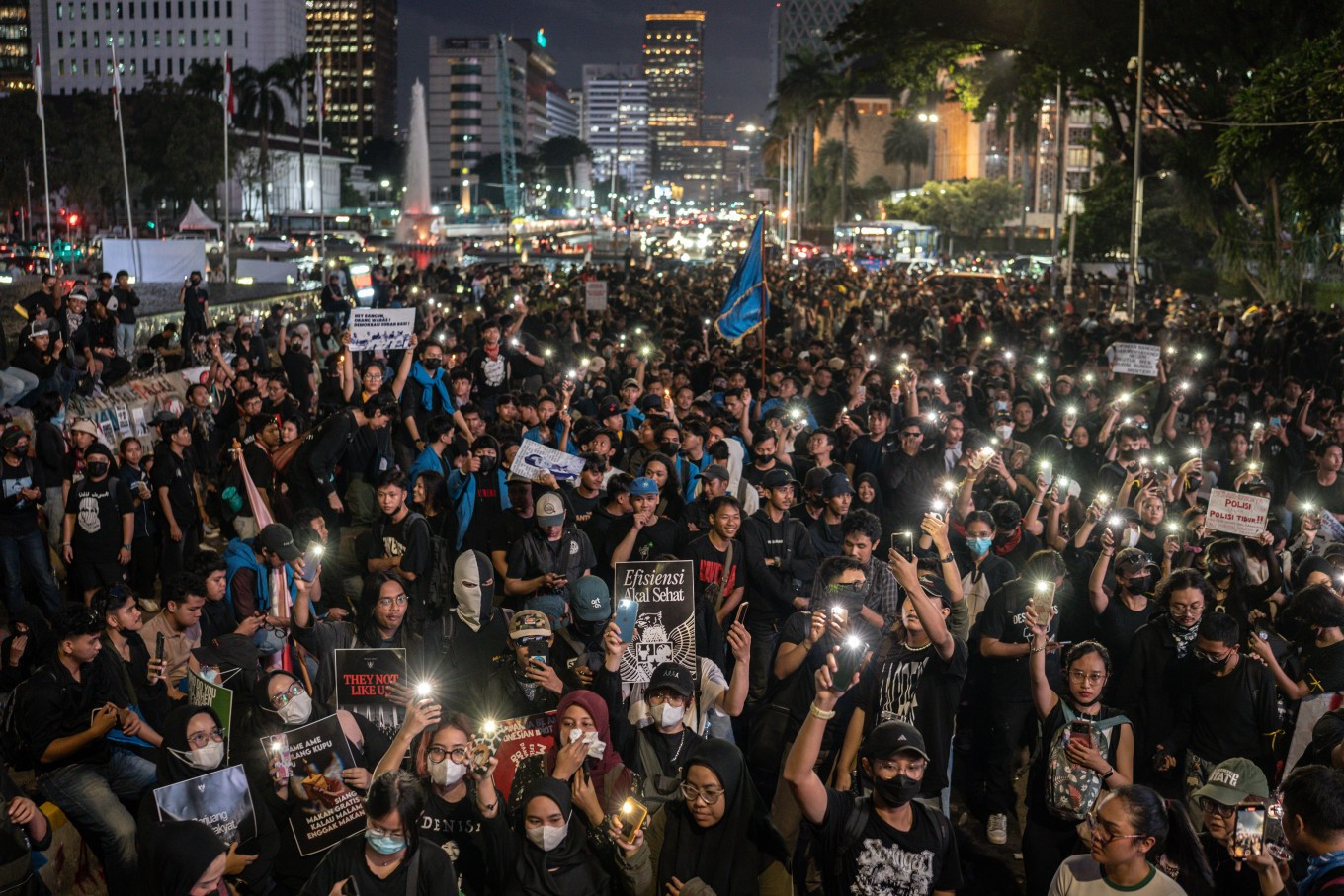News
'Dark Indonesia' most serious anti-government protest since Prabowo took charge
Tenggara Strategics March 4, 2025 Protesters light candles and flashlights on their cellular phones during a night-time protest near the Presidential Palace in Central Jakarta on Feb. 21, 2025. They demanded the government review budget cuts and the large allocation of funds to the free n
Protesters light candles and flashlights on their cellular phones during a night-time protest near the Presidential Palace in Central Jakarta on Feb. 21, 2025. They demanded the government review budget cuts and the large allocation of funds to the free n
The massive student demonstrations that erupted in several cities in Indonesia last week were the most serious anti-government protests since President Prabowo Subianto took charge in October. Clearly, all is not well in spite of his high approval ratings.
Prabowo may be popular in the public eye, but the country’s young political elite see it differently.
The “Indonesia Gelap” (Dark Indonesia) theme used in all of these protests contrasts with the upbeat Indonesia Emas (Golden Indonesia) tagline government officials continue to recite in many speeches. While they attacked specific government policies in their protests, the students’ choice of using a hashtag is a no confidence motion on the national leadership under Prabowo and his immediate predecessor Joko “Jokowi” Widodo, from 2014-2024.
Discontent among the youth was also reflected by #KaburAjaDulu (Let’s just flee first) which went viral around the same time in February. The hashtag encourages young people to look overseas for jobs and better lives, essentially giving the same thumbs down to the future of Indonesia.
The student protests went on for three days in Jakarta, Bandung, Lampung, Surabaya, Makassar, Malang, Samarinda, Banjarmasin, Banda Aceh and Denpasar. The protests may have ended for now, but the students have served notice to Prabowo of an undercurrent of discontent among the public about the direction the country is heading.
The #IndonesiaGelap hashtag harkens back to the phrase “Democracy dies in darkness” that the Washington Post used as its tagline in 2016 when Donald Trump was elected the first time around. It reflects concerns that many Indonesians have today with the backsliding of democracy, marked by a shrinking civic space and the rise of authoritarianism, trends that began during the administration of populist president Jokowi. Under Prabowo, there are now even signs of increasing militarism.
The protests were triggered after the government announcement in February of huge spending cuts to raise money to fund the ambitious free nutritious meal program, Prabowo’s signature policy.
The free meals program aims at providing lunch not only for some 82 million school children, but also for pregnant women and toddlers. Launched in January, the program has already run into serious financial problems. The Rp 71 trillion (US$4.4 million) already allocated under the current budget is nowhere near meeting the target.
The government has already increased the free meals budget to Rp 100 trillion, with money expected to come from spending cuts on infrastructure projects, the construction of the future capital city Nusantara, and many others.
The efficiency measures at all government agencies include cuts in spending on travel and meetings for civil servants, perks that have traditionally supported their meagre salaries. With morale running low among government workers because of the cuts, Prabowo can expect increasing resistance from the powerful civil service.
The protests, coordinated by the All-Indonesia Association of University Students Executive Board (BEM SI), were careful not to demand an end to the hugely popular free meals program, but instead insisting on greater financial transparency.
The students also used the opportunity to critique other government policies, including the recently revised mining law that allows universities to manage mining operations, as well as a rejection of the return of the “dual function” role of the military to intrude into civic affairs. Some of the protests have also demanded the prosecution of Jokowi on corruption charges.
While these specific policy demands may not live up to the students’ claim of Dark Indonesia, the movement stands out as one of the few, if not the only, anti-government voices in the country today when speech is increasingly suppressed.
Following Jokowi’s style of governance, Prabowo has built an even bigger coalition government that includes all but one of the political parties in the House of Representatives, as well as powerful special interest groups like those representing business, Islam, the military, and the police. Almost every significant political institution has been co-opted.
The effective use and control of internet regulations also means that the government holds sway over public opinion. Dissenting voices on social media are quickly drowned out and shouted down by massive amounts of pro-government content, posted either by machines or by “buzzers”, Indonesia’s term for a paid cyber army.
While students speak out of the darkness, their movement provides a glimmer of hope that there is resistance to stop or slow down Indonesia’s fall back into authoritarianism.
What we've heard
A government official recounted that one of the main triggers for the student protests in the Dark Indonesia movement was the increase in tuition fees announced by former higher education minister Satryo Soemantri Brodjonegoro. "This issue is very sensitive for students," the official said. However, the students' demands later expanded to include issues such as militarism and calls to stop Jokowi’s interference in Prabowo’s administration.

